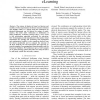174 search results - page 13 / 35 » Computer Science and Game Theory: A Brief Survey |
SIGCSE
2009
ACM
14 years 8 months ago
2009
ACM
Many CS1 courses lack a breadth in coverage of computing related topics and do not actively engage in nonprogramming computer science topics. In addition, many introductory (and...
TCS
2010
13 years 5 months ago
2010
The concept of stigmergy provides a simple framework for interaction and coordination in multi-agent systems. However, determining the global system behavior that will arise from ...
JSW
2007
13 years 7 months ago
2007
— The science of physics is based on theories and models as well as experiments: the former structure relations and simplify reality to a degree such that predictions on physical...
HCI
2009
13 years 5 months ago
2009
Games are increasingly being used as educational tools, in part because they are presumed to enhance student motivation. We look at student motivation in games from the viewpoint o...
FGR
2011
IEEE
12 years 11 months ago
2011
IEEE
— Despite major advances within the affective computing research field, modelling, analysing, interpreting and responding to naturalistic human affective behaviour still remains...

